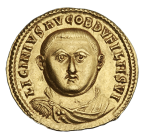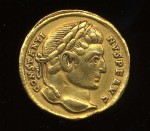Skip to comments.
I have witnessed the end of those who harassed the worshipers of God~Constantine's letter to Shapur
Gloria Romanorum ^
| 4/6/19
| Florentius
Posted on 04/06/2019 9:38:03 AM PDT by Antoninus
click here to read article
Navigation: use the links below to view more comments.
first 1-20, 21-40 next last
For any who think that Constantine didn't actually favor Christianity or that his affinity toward Christianity was somehow insincere, here is his letter to the Persian king Shapur II, written in AD 325.
Links and images provided in the original article.
1
posted on
04/06/2019 9:38:03 AM PDT
by
Antoninus
To: Antoninus
Is there a Cliff notes version? :)
bookmark for later
2
posted on
04/06/2019 9:40:53 AM PDT
by
dp0622
(The Left should know if.. Trump is kicked out of office, it is WAR)
To: dp0622
Is there a Cliff notes version? :)
LOL. This IS the Cliff Notes version. :-D
3
posted on
04/06/2019 9:46:33 AM PDT
by
Antoninus
("In Washington, swamp drain you.")
To: Antoninus
LOL
i’m SO LAZY :)
well, more like my attention span before bed is SO MUCH Better.
will make great reading later!
4
posted on
04/06/2019 9:47:55 AM PDT
by
dp0622
(The Left should know if.. Trump is kicked out of office, it is WAR)
To: dp0622
well, more like my attention span before bed is SO MUCH Better.
I hear you. Well, at least I inserted the line-breaks so it doesn't look like a giant block of text. Hope that helps!
5
posted on
04/06/2019 9:51:42 AM PDT
by
Antoninus
("In Washington, swamp drain you.")
To: Antoninus
I HATE that!!
4,000 words with no breaks lol
no this is broken up great
6
posted on
04/06/2019 9:53:33 AM PDT
by
dp0622
(The Left should know if.. Trump is kicked out of office, it is WAR)
To: Antoninus
Interesting that Constantine undertook the protection of persecuted Christians in the middle east - a policy
not since followed by most rulers (including the USA)...
To: CondorFlight
Interesting that Constantine undertook the protection of persecuted Christians in the middle east - a policy
It should be pointed out that Christians weren't persecuted in Persia prior to Constantine. Once the Roman Empire became Christian, however, things changed. Christians in Persia were increasingly seen as agents of the Romans.
8
posted on
04/06/2019 10:15:42 AM PDT
by
Antoninus
("In Washington, swamp drain you.")
To: CondorFlight
The Crusades, long after Constantine, were in part to protect Christians, and certainly fought to regain Christian lands lost in the Middle East.
9
posted on
04/06/2019 12:24:30 PM PDT
by
amorphous
To: Antoninus
It should be pointed out that Christians weren't persecuted in Persia prior to Constantine Not until Constantine co-opted Christianity for war and began persecuting and making war with others, including the remaining Jews in the Middle East.
To: Antoninus
Sounds like he was filled with the
Holy Spirit!
Did he know the Works ofJesus?
Is this a precursor of
Catholicism?
11
posted on
04/06/2019 12:46:27 PM PDT
by
Big Red Badger
(Despised by the Despicable!)
To: Big Red Badger
Constantine had the attributes to be one of our founders. His words of protections over Christians goes right along with our First Amendment rights.
12
posted on
04/06/2019 2:37:28 PM PDT
by
tflabo
(Prince of Peace, Lion of Righteousness)
To: amorphous
Not until Constantine co-opted Christianity for war and began persecuting and making war with others, including the remaining Jews in the Middle East.
Huh? If you read the sources, it's pretty clear that Constantine adopted Jesus as his protecting deity. He did not "co-opt" Christianity for war so much as attempt to beg the help of the Christian God in his military efforts.
Do you have evidence of any specific efforts of Constantine to make war on the Jews? I can't think of any off hand.
13
posted on
04/06/2019 3:28:00 PM PDT
by
Antoninus
("In Washington, swamp drain you.")
To: Big Red Badger
Is this a precursor of Catholicism?
The One Holy Catholic and Apostolic Church existed before Constantine.
14
posted on
04/06/2019 3:28:54 PM PDT
by
Antoninus
("In Washington, swamp drain you.")
To: Antoninus
This God I invoke with bended knees, and recoil with horror from the blood of sacrifices, from their foul and detestable odors, and from every earth-born magic fire: for the profane and impious superstitions which are defiled by these rites have cast down and consigned to perdition many, nay, whole nations of the Gentile world. For he who is Lord of all cannot endure that those blessings which, in his own loving-kindness and consideration of the wants of men, he has revealed for the use of all, should be perverted to serve the lusts of any. His only demand from man is purity of mind and an undefiled spirit; and by this standard he weighs the actions of virtue and godliness.
For his pleasure is in works of moderation and gentleness: he loves the meek, and hates the turbulent spirit: delighting in faith, he chastises unbelief: by him all presumptuous power is broken down, and he avenges the insolence of the proud. While the arrogant and haughty are utterly overthrown, he requires the humble and forgiving with deserved rewards: even so does he highly honor and strengthen with his special help a kingdom justly governed, and maintains a prudent king in the tranquility of peace.
Well written and praiseworthy
15
posted on
04/06/2019 6:46:03 PM PDT
by
af_vet_1981
(The bus came by and I got on, That's when it all began)
To: Antoninus
Constantine may be the fulfillment of Daniel 7:24-25, IMO, and the council of Nicaea a major event on the prophetic calendar.
24 The ten horns are ten kings who will come from this kingdom. After them another king will arise, different from the earlier ones; he will subdue three kings. 25 He will speak against the Most High and oppress his holy people and try to change the set times and the laws. The holy people will be delivered into his hands for a time, times and half a time.
He changed the times of the Jews in the 4th century. And in the early part of the 5th century, those who came after him, stopped the sacrifice under penalty of death.
The Persecution of the Jews in the Roman Empire (300-428)
http://vlib.iue.it/carrie/texts/carrie_books/seaver/text.html
To: amorphous
He changed the times of the Jews in the 4th century.
That doesn't answer my question. Did Constantine actually go after the Jews at all? I don't believe he did.
17
posted on
04/07/2019 6:01:07 AM PDT
by
Antoninus
("In Washington, swamp drain you.")
To: Antoninus
Did Constantine actually go after the Jews at all? Of course he did, and even before the council met, he went "after the Jews" when the edict was issued in 313.
I don't believe he did.
Don't take my word for it, do your own research into the matter.
To: amorphous; Antoninus
Ref:
Constantine’s edict gave Christians the right to openly practice their faith. Until then, they had met in the homes of fellow believers. Within a year of the edict, Constantine ordered the building of churches throughout the empire. With new churches came a more formal organization.
Although some Christians worried about the future of the church if it became too closely identifi ed with the empire, most Christians were pleased with Constantine’s edict. It meant an end to the persecutions they had suffered from time to time and new access to power and infl uence. Other groups saw reason to worry. The only people the edict mentioned by name were the Christians, and the laws that came afterward radically limited the rights of Jews as citizens of the Roman Empire. For example, in the year 315, Constantine issued the following edict:
We wish to make it known to the Jews and their elders and their patri-archs that if, after the enactment of this law, any one of them dares to attack with stones or some other manifestation of anger another who has fl ed their dangerous sect and attached himself to the worship of God [Christianity], he must speedily be given to fl ames and burn—together with all his accomplices.
Moreover, if any one of the population should join their abominable sect and attend their meetings, he will bear with them the deserved penalties.3
This law had two purposes. One was to prevent Jews from interfering with relatives or friends who converted to Christianity. The other was to discourage Christians from converting to Judaism.
Constantine’s description of Judaism as “dangerous” and “abominable” is very different from the opinions expressed a century earlier by Dio Cassius , who seemed to regard Jews with respect, toleration, and curiosity. Edicts issued by later emperors refl ected Constantine’s views. Increasingly, Jews were regarded with disrespect, intolerance, and disgust.
https://www.facinghistory.org/sites/default/files/Ch.2.pdf
To: amorphous
It may be somewhat revisionist, however, to impute tolerance as a meaningful legacy of the Constantinian decree. Rather, the Edict represents more of a shift in the empire’s religious direction than a commitment to religious tolerance per se. Its particular importance was the legalization of Christianity, Constantine’s new-found religion which he famously embraced prior to the Battle of the Milvian Bridge (28 October 312), where he defeated his western rival, Maxentius, four months before issuing the Edict of Milan. Emperor worship may have been on its way out, but the will of the emperors still held the day, and in the end, the Edict served to consolidate Constantine’s imperial power. On one hand, the Edict of Milan was a direct political maneuver by Constantine and Licinius against their rival Maximinus (Ceasar of the East), who had rescinded the previous Edict of Galerius (d. April/May 311) and had renewed persecutions against Christians in the East. Licinius defeated Maximinus later in the year and assumed full control of the East as its lone Augustus in August 313. On the other hand, while the Edict legalized Christianity, it did not stop Constantine from eventually executing the edict’s co-author, Licinius (below left), in 325, after defeating him in civil war in 324 CE. Apparently, there was little room for tolerance among imperial rivals, and Constantine (below center) ruled the empire as its sole emperor until his death in 337.



While Constantine is sometimes mistakenly credited with making Christianity the official religion of the Roman Empire, this took place sixty-seven years later in 380 CE under Theodosius (d. 395, above right). In the meantime, the fourth-century empire experienced drastic shifts in its official religious expression as pagan, Arian and Nicene-Christian emperors all assumed the throne during this period. As Nicene Christianity gained a permanent ascendancy, people were once again denied the right to observe the religion, or even the Christianity, of their preference. The ideals of tolerance and religious freedom outlined in the Edict of Milan gave little protection to Jews and Arians.
The immediate effect of the Edict; however, made a significant impact upon the Christian topography of Milan and other cities throughout the empire. The Edict allowed the official building of new churches and the public burial of saints. One of the local ‘winners’ was Mirocles (Mirocle), the bishop of Milan. After the Edict, Mirocles (d. c. 316) started the erection of the basilica vetus, the city’s first cathedral, built on the location of the present-day Duomo. He is buried in Milan’s San Vittore al Corpo.
https://medievalmilanetc.wordpress.com/2013/02/04/the-edit-of-milan/
Navigation: use the links below to view more comments.
first 1-20, 21-40 next last
Disclaimer:
Opinions posted on Free Republic are those of the individual
posters and do not necessarily represent the opinion of Free Republic or its
management. All materials posted herein are protected by copyright law and the
exemption for fair use of copyrighted works.
FreeRepublic.com is powered by software copyright 2000-2008 John Robinson


